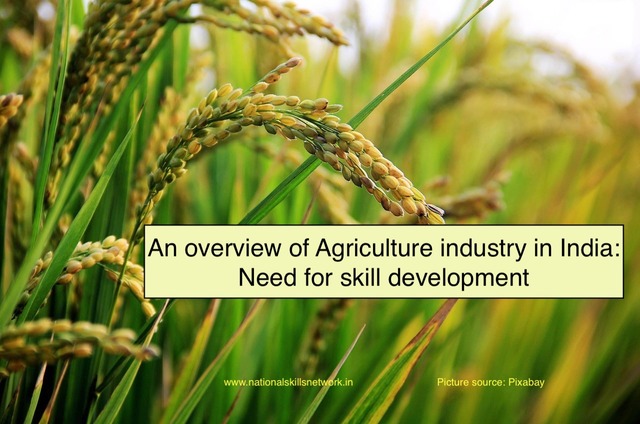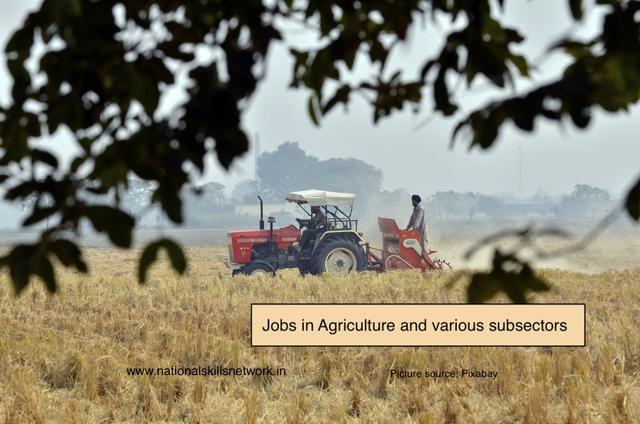About 43% of India’s population is dependent on agriculture as the primary source of their livelihood. India is the largest producer of spices, pulses, milk, tea, cashew and jute; and the second largest producer of wheat, rice, fruits, vegetables, sugarcane, cotton and oilseeds. Further, India is second in global production of fruits and vegetables, and is the largest producer of mango and banana.
India is among the 15 leading exporters of agricultural products in the world and it was the ninth largest exporter of agricultural products in 2017. The Indian government, in December 2018, has approved The Agriculture Export Policy. This new policy aims to increase India’s agricultural exports to US$ 60 billion by 2022. (Source: IBEF)
Indian Government and its efforts towards the sector
Being a primary and crucial sector, the improvement of agriculture sector has always been prioritised by the government. The Indian government, through various schemes and programmes has always been making continuous efforts to assist the agriculture sector.
- The Electronic National Agriculture Market (eNAM) – The eNAM Scheme was launched in April 2016 to create a unified national market for agricultural commodities by networking existing Agriculture Produce Marketing Committees (APMCs). Upto May 2018, 9.87 million farmers, 109,725 traders were registered on the e- NAM platform. 585 mandis in India have been linked, while 415 additional mandis will be linked in 2018-19 and 2019-20. Cumulative trade on the platform reached ₹41,855 crore (US$ 6.49 billion) by March 2018.
- The Pradhan Mantri Gram Sinchai Yojana: This scheme aims to irrigate the field of every farmer and improving water use efficiency to achieve the motto `Per Drop More Crop’. Overall the scheme ensures improved access to irrigation. Around 285 new irrigation projects have been undertaken in 2018 to provide irrigation for 18.8 million hectares of land. As per Union Budget 2019-20 the scheme has been allocated US$ 565.16 million.
- Paramparagat Krishi Vikas Yojana (PKVY) – An increasing shift of trend to an organic style of living has created thorough demand for organic farming. The government, realising the futuristic potential that this area holds, has introduced the PKVY scheme. This scheme aims to motivate groups of farmers to take up organic farming. It also gives them incentives to promote this type of farming.
 Skill Development in the Agriculture Sector
Skill Development in the Agriculture Sector
Agriculture Skill Council of India (ASCI) is the apex organization that facilitates an ecosystem for skilling agriculture and allied sectors. ASCI plays a key role in maintaining training standards through NSQF compliant curriculum, certification and assessments by coordinating with the industry, training partners and academic institutions across India. Read more about ASCI https://asci-india.com/
Besides, job-role based training from ASCI, training programmes in farming and allied sectors are also conducted at 690 Krishi Vigyan Kendras (KVKs) across the country. The government believes that this step would fasten the pace of skill development in the agriculture sector by training its workforce with accordance to the demand.
Doubling the farmer’s income is one of the major and important targets of the Union Budget of 2019- 2020. This can be achieved only when the skill gap prevailing in the agriculture sector is bridged. The KVK Scheme is bound to enhance relevant skills to match the rapidly growing demand in the agriculture sector. The government is also planning to develop agriculture as a private enterprise, with the aim of attracting the youth of the country, both in urban as well as rural regions.
Entrepreneurial opportunities in agriculture and allied sectors
India’s agriculture sector is gradually inclining towards different technologies such as financial technology, machine learning and digitisation. This is leaving a scope for both technology as well as agriculture enthusiasts to begin ambitious projects and businesses in the industry. Additionally, several organisations and incubators like Agri Udaan are now helping food and agriculture startups through market networking, investor pitching and timely mentoring. An interesting thing about these agriculture startups is that they are collectively generating high employment, especially in rural areas, where agriculture is predominant.
Challenges faced by the agriculture sector
- The agriculture sector is highly volatile in nature. It is mostly prone to natural calamities. This leaves the sector in the need of constant security and damage control mechanisms. Crop and harvest related challenges are quite inevitable, given to the dynamic nature of this industry. The industry however, is taking great measures in wastage reduction and damage control, with the help of government schemes, smart agriculture plans, risk financing and modern technology.
- The lack of awareness and highly prevailing exploitation in the farming sphere are hindering the growth of this sector to a large extent. Farmer suicides are common headlines now. Lack of proper awareness and knowledge regarding several elements is resulting in improper farming practices, inaccurate financial operations and eventually, in stagnant growth. This is one of the most critical challenges that the agriculture industry is facing is yet to be tackled. Steps are now being taken to solve this issue. Several organisations are beginning to do awareness campaigns in rural regions. Financial and technological based institutions are organising programmes for farmers.
On the whole, the agriculture industry is a complex, yet crucial sector which is contributing a lot to our economy. Despite being the major contributor, the industry still holds massive potential that is waiting to be tapped. This can be possible only when there are efforts made to tackle the challenges faced by this industry in an upfront and smart manner. Let’s hope that our golden sector goes high up the ladder, soon!













